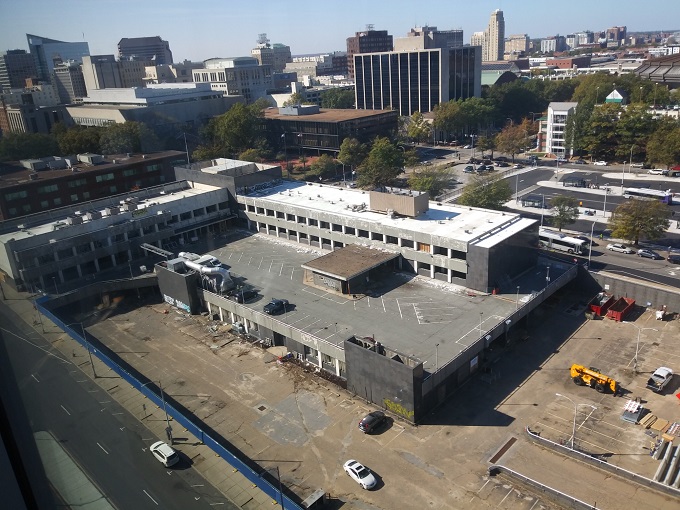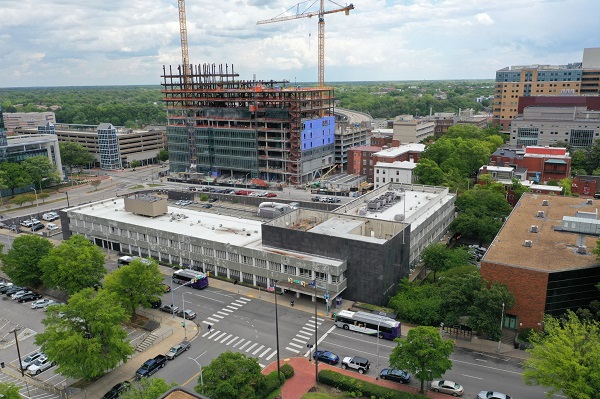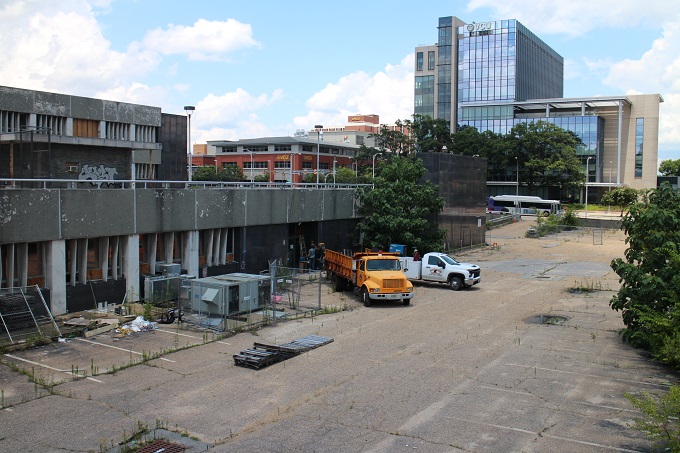
Site prep for demolition of the Public Safety Building has ramped up in recent weeks. (Jonathan Spiers photo)
VCU Health’s costly exit from an ill-fated downtown development project is set to get a closer look from officials on both the state and federal level.
On Monday, the Joint Legislative Audit & Review Commission, the oversight agency of the Virginia General Assembly, included the health system among topics it approved for in-depth study in the coming year.
The study will focus primarily on VCU Health’s governance structure in light of the aborted redevelopment of Richmond’s old Public Safety Building that required the health system to pay $73 million to exit, along with ongoing costs that continue to add up.
A resolution approved Monday directs JLARC’s staff to review the VCU Health System Authority as a whole, with particular attention paid to evaluating “the membership, duties, and authorities” of the health system’s board of directors, as well as advantages and disadvantages of “the integrated relationship between the Health System’s board and executive staff and the university’s board and executive staff.”
The study also is to compare the relationship between the health system and the university “to other Virginia teaching hospitals and their university affiliates”; evaluate the health system’s procurement function, “in particular capital planning and construction”; and evaluate VCU Health’s oversight of capital projects, according to the resolution.
It adds that all state agencies, including VCU Health, VCU and their respective boards, “shall provide assistance, information, and data to JLARC for this study” upon request.

A rendering of the 17-story multibuilding office complex that was planned to replace the Public Safety Building. (BizSense file)
The approval comes one month after JLARC’s Topic Selection Subcommittee included the health system among a half dozen other topics it recommended for study in 2024. Following selection, studies can take anywhere from seven to 17 months to complete and deliver to the commission, according to JLARC’s website.
JLARC Director Hal Greer, who presented the study topics Monday, said after the meeting that a team has yet to be assigned for the VCU Health study but that his staff’s plan is to complete it and present its findings sometime in 2024.
The project exit payment and the circumstances that led up to it have drawn scrutiny from Gov. Glenn Youngkin, who in September sent a letter to General Assembly leadership urging changes to the VCU Health System Authority’s governance, including the replacement of Virginia Commonwealth University President Michael Rao as chairman of the authority’s Board of Directors.
The events also have drawn criticism from former governor Doug Wilder, who in the days after the exit payment was revealed in May called on JLARC to investigate the matter, describing the payment as “financial misbehavior” and a “misappropriation of VCU spending.”
Wilder also called for the university’s Board of Visitors to fire Rao, who serves as president of the health system as well as the university. Rao has described the health system presidency as a non-operational role, as VCU Health’s bylaws put its CEO in charge of operations.
Rao has said he supports Youngkin’s thinking on the matter, including the governor’s suggestion of replacing Rao as chairman and having him remain on the health system board as an ex officio member. The bylaws currently require that the university president serve as the board’s chairman.

The Public Safety Building as viewed along Ninth Street in 2020, with the under-construction VCU Health Adult Outpatient Pavilion building rising behind it. (BizSense file)
JLARC’s resolution states that VCU Health is required by law to engage in “specialized management and operational practices to remain economically viable, earning revenues necessary for operations, and participating in arrangements with public and private entities.”
The resolution also notes VCU and VCU Health’s “integrated governance and leadership structures,” which include several dual administrative positions and some members who serve on both boards. It points out specifically the university president’s chairmanship role on the VCU Health board, and that “the selection and removal of the health system’s CEO is the joint responsibility” of both boards.
That latter responsibility was exercised last November, when Art Kellermann – the then-VCU Health CEO who argued against the Public Safety Building project before signing off on it at university officials’ urging – resigned at Rao’s request, according to an announcement at the time that did not specify a reason for the leadership change.
The decision to exit the project was made around that time by the VCU Health board, which in December authorized the $73 million exit payment that allowed the health system to break its lease as the project’s master tenant. The payment was made in February but wasn’t revealed by the health system until May, in response to Freedom of Information Act requests from Richmond BizSense.
DOJ asked to review $73M payment

The site is across Leigh Street from VCU’s College of Health Professions building. (BizSense file photo)
Meanwhile, Wilder, a professor at VCU and namesake of its L. Douglas Wilder School of Government and Public Affairs, has since called for the involvement of Virginia’s congressional delegation, last month sending a request to U.S. Sens. Mark Warner and Tim Kaine and Reps. Bobby Scott and Jennifer McClellan asking that they weigh in on the issue.
A response letter signed by Warner, Kaine and Scott said they considered the matter a state issue, but that they had forwarded Wilder’s letter to the U.S. Department of Justice, which they said can determine “whether there is any reason to believe that there was any misuse of federal funds” in connection with the $73 million exit payment.
Wilder’s request had noted that both VCU Health and VCU receive federal funds through research dollars and Medicaid and Medicare reimbursements. Acknowledging that is the case, the response letter states that there’s no information to suggest that any federal funds were used in the payment, but that they were forwarding the request “out of an abundance of caution.”
The response adds that the congressmen’s offices had discovered that members of the VCU Health board were required to sign confidentiality agreements prohibiting them from revealing information about the issue to the VCU Board of Visitors, which they said “seems troubling.”
The response was not signed by Rep. McClellan, whose chief of staff told BizSense the congresswoman was recusing herself from the issue at the direction of the House Ethics Committee due to her former membership on the health system board from mid-2022 to March 7 of this year.
The chief of staff said McClellan, at the time a state senator, was not asked to sign a confidentiality agreement and has no knowledge of such a requirement.
The response letter from Warner, Kaine and Scott suggests that the confidentiality agreements restricted communication about the project between the VCU Health and VCU boards.
The letter states: “…there appears to be controversy over whether the Authority kept the Board of Visitors fully apprised of its actions regarding the development. We have insufficient knowledge to comment on the advisability of the deal or the decision to terminate the deal. But, those entrusted by state law to manage the university and health system should be transparent, especially in a transaction of this magnitude.”
The letter adds: “In a situation like this, the Board (of Visitors) cannot completely police itself. This is particularly the case because there may be statutory fixes necessary to create a more appropriate working relationship between the Board and the Authority.
“We were pleased to see that the Joint Legislative Audit & Review Commission appears to agree that this matter needs its attention,” the letter continues. “We read recent statements of Governor Youngkin and Attorney General Miyares as supportive of the notion that the structure of the University and Health System needs reexamination. (We) believe some university officials have welcomed such a reexamination.”
Note: This story has been updated to clarify the roles of VCU Health’s president and CEO according to its bylaws.

Site prep for demolition of the Public Safety Building has ramped up in recent weeks. (Jonathan Spiers photo)
VCU Health’s costly exit from an ill-fated downtown development project is set to get a closer look from officials on both the state and federal level.
On Monday, the Joint Legislative Audit & Review Commission, the oversight agency of the Virginia General Assembly, included the health system among topics it approved for in-depth study in the coming year.
The study will focus primarily on VCU Health’s governance structure in light of the aborted redevelopment of Richmond’s old Public Safety Building that required the health system to pay $73 million to exit, along with ongoing costs that continue to add up.
A resolution approved Monday directs JLARC’s staff to review the VCU Health System Authority as a whole, with particular attention paid to evaluating “the membership, duties, and authorities” of the health system’s board of directors, as well as advantages and disadvantages of “the integrated relationship between the Health System’s board and executive staff and the university’s board and executive staff.”
The study also is to compare the relationship between the health system and the university “to other Virginia teaching hospitals and their university affiliates”; evaluate the health system’s procurement function, “in particular capital planning and construction”; and evaluate VCU Health’s oversight of capital projects, according to the resolution.
It adds that all state agencies, including VCU Health, VCU and their respective boards, “shall provide assistance, information, and data to JLARC for this study” upon request.

A rendering of the 17-story multibuilding office complex that was planned to replace the Public Safety Building. (BizSense file)
The approval comes one month after JLARC’s Topic Selection Subcommittee included the health system among a half dozen other topics it recommended for study in 2024. Following selection, studies can take anywhere from seven to 17 months to complete and deliver to the commission, according to JLARC’s website.
JLARC Director Hal Greer, who presented the study topics Monday, said after the meeting that a team has yet to be assigned for the VCU Health study but that his staff’s plan is to complete it and present its findings sometime in 2024.
The project exit payment and the circumstances that led up to it have drawn scrutiny from Gov. Glenn Youngkin, who in September sent a letter to General Assembly leadership urging changes to the VCU Health System Authority’s governance, including the replacement of Virginia Commonwealth University President Michael Rao as chairman of the authority’s Board of Directors.
The events also have drawn criticism from former governor Doug Wilder, who in the days after the exit payment was revealed in May called on JLARC to investigate the matter, describing the payment as “financial misbehavior” and a “misappropriation of VCU spending.”
Wilder also called for the university’s Board of Visitors to fire Rao, who serves as president of the health system as well as the university. Rao has described the health system presidency as a non-operational role, as VCU Health’s bylaws put its CEO in charge of operations.
Rao has said he supports Youngkin’s thinking on the matter, including the governor’s suggestion of replacing Rao as chairman and having him remain on the health system board as an ex officio member. The bylaws currently require that the university president serve as the board’s chairman.

The Public Safety Building as viewed along Ninth Street in 2020, with the under-construction VCU Health Adult Outpatient Pavilion building rising behind it. (BizSense file)
JLARC’s resolution states that VCU Health is required by law to engage in “specialized management and operational practices to remain economically viable, earning revenues necessary for operations, and participating in arrangements with public and private entities.”
The resolution also notes VCU and VCU Health’s “integrated governance and leadership structures,” which include several dual administrative positions and some members who serve on both boards. It points out specifically the university president’s chairmanship role on the VCU Health board, and that “the selection and removal of the health system’s CEO is the joint responsibility” of both boards.
That latter responsibility was exercised last November, when Art Kellermann – the then-VCU Health CEO who argued against the Public Safety Building project before signing off on it at university officials’ urging – resigned at Rao’s request, according to an announcement at the time that did not specify a reason for the leadership change.
The decision to exit the project was made around that time by the VCU Health board, which in December authorized the $73 million exit payment that allowed the health system to break its lease as the project’s master tenant. The payment was made in February but wasn’t revealed by the health system until May, in response to Freedom of Information Act requests from Richmond BizSense.
DOJ asked to review $73M payment

The site is across Leigh Street from VCU’s College of Health Professions building. (BizSense file photo)
Meanwhile, Wilder, a professor at VCU and namesake of its L. Douglas Wilder School of Government and Public Affairs, has since called for the involvement of Virginia’s congressional delegation, last month sending a request to U.S. Sens. Mark Warner and Tim Kaine and Reps. Bobby Scott and Jennifer McClellan asking that they weigh in on the issue.
A response letter signed by Warner, Kaine and Scott said they considered the matter a state issue, but that they had forwarded Wilder’s letter to the U.S. Department of Justice, which they said can determine “whether there is any reason to believe that there was any misuse of federal funds” in connection with the $73 million exit payment.
Wilder’s request had noted that both VCU Health and VCU receive federal funds through research dollars and Medicaid and Medicare reimbursements. Acknowledging that is the case, the response letter states that there’s no information to suggest that any federal funds were used in the payment, but that they were forwarding the request “out of an abundance of caution.”
The response adds that the congressmen’s offices had discovered that members of the VCU Health board were required to sign confidentiality agreements prohibiting them from revealing information about the issue to the VCU Board of Visitors, which they said “seems troubling.”
The response was not signed by Rep. McClellan, whose chief of staff told BizSense the congresswoman was recusing herself from the issue at the direction of the House Ethics Committee due to her former membership on the health system board from mid-2022 to March 7 of this year.
The chief of staff said McClellan, at the time a state senator, was not asked to sign a confidentiality agreement and has no knowledge of such a requirement.
The response letter from Warner, Kaine and Scott suggests that the confidentiality agreements restricted communication about the project between the VCU Health and VCU boards.
The letter states: “…there appears to be controversy over whether the Authority kept the Board of Visitors fully apprised of its actions regarding the development. We have insufficient knowledge to comment on the advisability of the deal or the decision to terminate the deal. But, those entrusted by state law to manage the university and health system should be transparent, especially in a transaction of this magnitude.”
The letter adds: “In a situation like this, the Board (of Visitors) cannot completely police itself. This is particularly the case because there may be statutory fixes necessary to create a more appropriate working relationship between the Board and the Authority.
“We were pleased to see that the Joint Legislative Audit & Review Commission appears to agree that this matter needs its attention,” the letter continues. “We read recent statements of Governor Youngkin and Attorney General Miyares as supportive of the notion that the structure of the University and Health System needs reexamination. (We) believe some university officials have welcomed such a reexamination.”
Note: This story has been updated to clarify the roles of VCU Health’s president and CEO according to its bylaws.
I really do not see how Rao survives this. It’s shocking enough that we have Wilder and Youngkin on the same page; that has to mean something.
Still don’t understand how Rao has kept his job. No other CEO would lose 73+
million and keep his job.
The last 4 to 5 articles written on this subject by BizSense is all the JLARC needs to make a decision. The work has already been done! But I bet they won’t even entertain it because they are smarter than everyone else.
I feel like this is the same as asking a police department to conduct an “Internal Review”. No wrongdoing will be found depending on which way the political winds blow at the time.
But I could be wrong on that. We shall see.